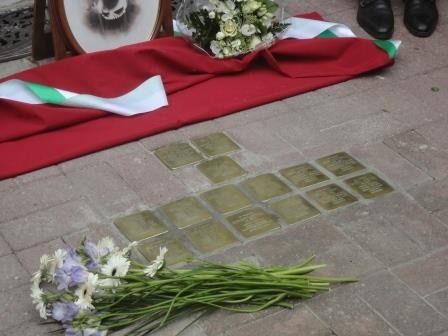Exactly 75 years ago, on 12 June 1943, Gestapo police in Nazi-occupied Brussels raided a private boarding school in Woluve-Saint-Pierre and arrested the Jewish children who were hiding there together with the headmaster of the school and her husband. The razzia followed a denunciation by local collaborators. The event was commemorated today by the municipality, in cooperation with the neighbourhood committee and the Association for the Memory of the Holocaust, with the inauguration of 15 stones in the pavement in memory of the victims and as a warning against anti-Semitism and xenophobia today.
Pascal Lefevre, councillor in Woluve-Saint-Pierre, told The Brussels Times that the decision to commemorate the razzia in this way was taken unanimously by the municipality.
“Memory stones are normally initiated by relatives or private organisations but in this case it’s a public body,” he said proudly, “after research done by the neighbourhood committee.”
Each stone bears the name of the victim, birth year, arrest date (12.6.1943), deportation date (mostly 31.7.1943) and death year (exact date mostly unknown).
The stones (“stolperstein” in German) are placed right in the pavement at rue André Fauchille 10 where the school, Gatti de Gamond, was located. The original building was damaged during the war and replaced by another building in 1950.
The school was run by Odile Ovart-Henri. She and her husband Remy belonged to the resistance and gave Jewish children shelter. The couple, their daughter and 12 children were caught by Gestapo, brought to its headquarter at Avenue Louise, and detained in the transition camp at Kazerne Dossin in Mechelen, from where most of them were deported to a certain death in Auschwitz.
When Gestapo raided the school, they took away all the hidden Jewish children except one baby whom Odile Ovart snatched from the arms of a policeman and handed to a non-Jewish person who happened to be on the premises. One child managed to escape from a hospital in Mechelen.
The couple’s daughter Andrée was offered the only ticket to escape by her parents. In 1980, she established “La famille d´accueil Odile Henri”, a foundation in memory of her mother which is active in finding hospitable families for children in need.
Odile Ovart-Henri was sent to Ravensbrueck and Bergen-Belsen camps, where she succumbed to typhus on 31 March 1945. Her husband Remy Ovart was deported to Sachsenhausen and Buchenwald camps, and shot dead when he failed to keep up in a death march.
In 1985, they were recognized as Righteous Among the Nations by Yad Vashem, the Holocaust remembrance centre in Jerusalem.
In the latest issue of its monthly magazine, WoluMAG 1150, the municipality of Woluwe-Saint-Pierre has published an article in French and Dutch on the razzia which took place 75 years ago. The magazine is distributed to all inhabitants in the municipality.
The Brussels Times

